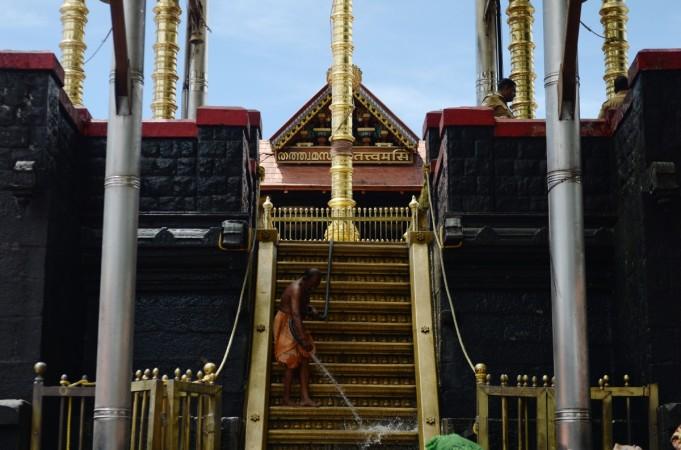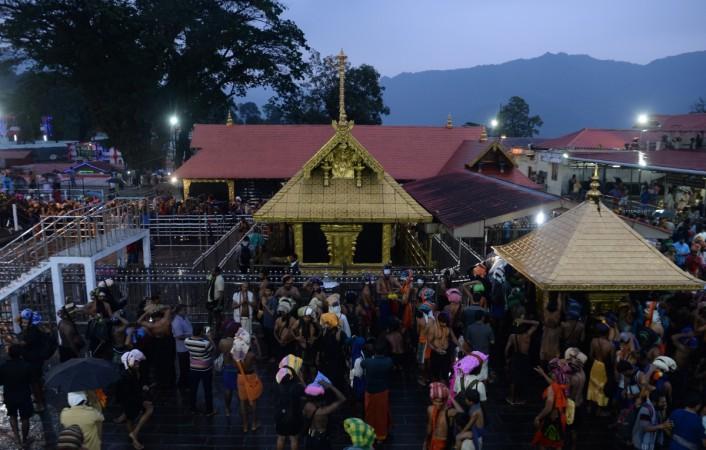Sabarimala's Travancore Devaswom Board made a 180-degree turn and said on Wednesday, February 6, that it will adhere to the Supreme Court's judgment on allowing women of menstruating age, i.e. between the ages 10 and 50 into the temple.
The Supreme Court had reserved the judgment of 65 petitions -- including 56 review petitions and four writ petitions -- which pleaded with the top court to reconsider its verdict on allowing women of menstruating age to enter the temple.

The Sabarimala Temple was embroiled in controversy during late 2018 when the Supreme Court passed the verdict allowing the entry of women. This kindled massive protests and violence in Sabarimala during the pilgrimage season resulting in multitudes of young women threatened by protesters at the base camps of the temple.
The Supreme Court bench led by Chief Justice of India, Ranjan Gogoi, said that there was no need to change the original verdict.
Lawyer K Parasaran who represented the petitioners argued that the earlier verdict did not include the contents of the Preamble as well as Articles 15, 17 and 25.
The Court gave 90 minutes for those supporting the Supreme Court verdict to make their case.
Advocate Jaideep Gupta said, "A challenge on the ground of untouchability or any other provision will not affect the verdict," the Kerala government told the court, adding that it is "it is not a private issue but a public law issue unless they argue that women between age 10 to 50 are not a class of Hindus."
Advocate P Dinesh, who was also for the Supreme Court verdict said, "Most of the review petitioners here are violators of the judgment of this honourable court, who were rioting on streets. Your Lordships should ask them on what grounds they have come here in the review."

What made the Supreme Court do a double take was the Travancore Board supporting the Supreme Court's original judgment.
Senior Counsel Rakesh Dwivedi, appearing for the Travancore Board said, "We have to transform society...we should not point out biological attributes to exclude women from any walk of life."
While all the petitions requested the Court to reconsider its previous judgment, four women submitted applications to allow them to be a part of the case.
"There are thousands of women waiting for Darshan at Sabarimala and are waiting the final outcome of the review petitions, when this court would be pleased to hear and finally decide. The applicants may be permitted to intervene and make their submissions before this court when the Review Petitions are heard by this court, in order to oppose the Reviews," two women, Reshma and Shanila said in their petition, reports Firstpost.
Bindu and Kanakadurga are two women who managed to enter the temple and visit Lord Ayappa's sanctum on January 2 of this year.
In their application, they said, "The judgment of this court on 28 September, 2018, upheld the dignity, liberty and equality of women of all ages and sent a strong message to the society against menstrual taboo. Proposed intervenors pray that they may also be heard to oppose the review, in case this court is inclined to review the judgment. It is in the interest of justice that the Proposed Intervenors are heard".

Many women attempted to enter the temple since the verdict. However, due to the massive protests and the threats of violence, they couldn't do so.
The Kerala government confirmed that Bindu and Kanakadurga did indeed enter the temple in the early hours of January 2. The aftermath of this led to protests, closing down if the Sabarimala temple in order to purify it and a shutdown in the state of Kerala.

















